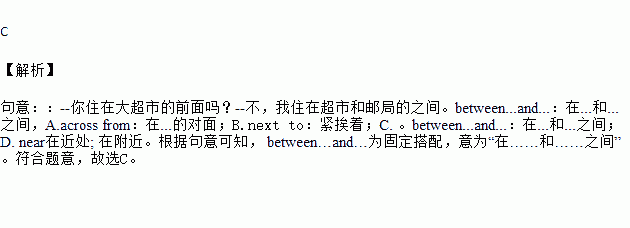题目内容
—Do you live in front of the big supermarket?
—No. I live ________ the supermarket ________ the post office.
A. across; from B. next; to C. between; and D. near; to
 53天天练系列答案
53天天练系列答案书面表达根据要求完成短文写作,请将作文写在答题卡指定的位置上。
珍妮(Jenny)的生日就要到了,她的朋友们通常都会根据她的喜好送给她一些生日礼物。请根据下面表格的提示,写一篇60词左右的短文。
Jenny的兴趣爱好 | 吃巧克力 | 听音乐 | 打篮球 |
Jenny的朋友送她的生日礼物 | Jack总是送她一盒巧克力 | Mary通常送她一个CD,有时会送她一张音乐会门票 | Kate从不送她篮球,总是送她一件T-shirt |
作文要求:
不能照抄原文;不得在作文中出现学校真实的名称和学生的真实姓名。
Jenny’s birthday is coming soon.
________________________________________________________________________________________________________________________________________________________________________________________________________________________________________________________________________________________________________________________________________________________________________________________________________________________________________________________________________________________________
Hi, I’m Amy. I’m here to help you with any study-related (有关系的) problem, big or small. Please send me a message anytime. —Amy |
My problem is time — I don’t have enough time. Next month, I will have twelve exams. How can I possibly study for all of them? I think it’s difficult and impossible. —Cindy Hi, Cindy. It isn’t impossible but you have to get started now. Make a study plan and prepare for each subject. It’s better to study for an hour a day than just once a week, all day. —Amy |
I share a bedroom and a desk with my sister. When we study at the desk together, she distracts (使分心) me because she is noisy. I try to talk with her about it, but she gets angry. Can you help me? —Jane Hi, Jane. You and your sister can use the desk at different times. You can talk about it with her. Or you can study at the school library a few times a week. If it’s easier to write instead of (而不是) talking face to face, try messaging her and explain (解释) how ▲you feel. —Amy |
I’m silly. I just find it hard to study. I always stop and start and I keep getting the feeling that I’m learning wrong things. I don’t think you can really help me. —Liza Liza, you’re not silly at all! Lots of students have the same experience as you. Sometimes things will improve if you join a study group. Join a group and meet twice or three times a week after school to study together. It’s helpful for lots of students. —Amy |
根据材料内容选择最佳答案。
1.What is Cindy’s problem?
A. Her teachers don’t like her.
B. Her parents don’t understand her.
C. She doesn’t want to study for her exams.
D. She doesn’t have enough time to study for her exams.
2.Who lives in the same bedroom with her sister?
A. Amy.
B. Cindy.
C. Jane.
D. Liza.
3.The best word for “ ▲” is “______”.
A. terrible
B. afraid
C. lucky
D. excited
4.What does Amy think of Liza?
A. She is silly.
B. She is noisy.
C. She learns quickly.
D. She has a common problem.
5.Amy advises Liza to ______.
A. make a plan
B. join a study group
C. talk with her friends
D. study in the school library

